Strawberry farming is not a new concept. It’s been around for centuries. However, the way we farm strawberries has changed dramatically over the years and continues to do so. One of the newer methods of strawberry farming is called vertical farming. This type of farming allows farmers to grow more strawberries in a smaller space. Not only does this reduce the amount of land needed to farm, but it also protects the berries from pests and diseases.
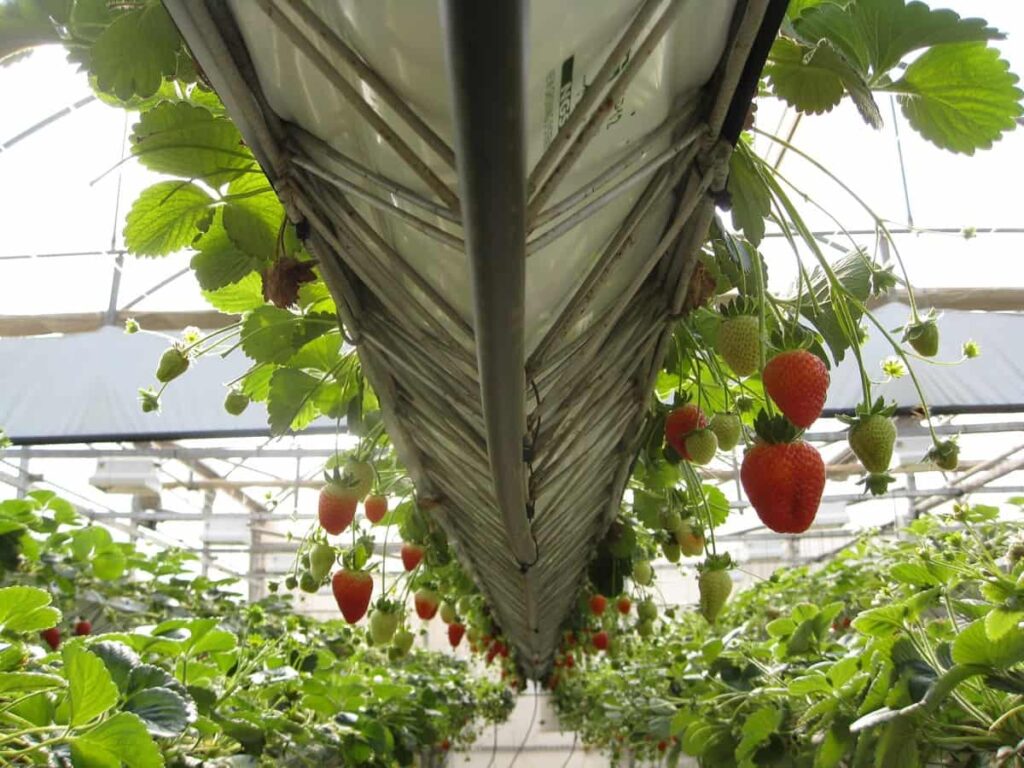
If you are planning for a way to increase your income and fruit yield, vertical strawberry farming may be the perfect solution. This post will explore the benefits of this type of farming and how you can get started.
What is vertical strawberry farming?
Vertical strawberry farming is a new way to increase your income by growing strawberries in a vertical orientation. This type of farming allows for more strawberries to be grown in a smaller space, which can lead to higher profits.
Vertical strawberry farming can be done using different methods, such as towers or trellises. This type of farming can also help to improve the quality of the strawberries, as they will receive more sunlight and air circulation. You can also grow strawberries vertically using Hydroponic system and Greenhouse controlled system.
Benefits of vertical strawberry farming
Vertical strawberry farming is the perfect option if you’re looking for a new and innovative way to increase your income. Vertical strawberry farming is a type of agriculture that involves growing strawberries in vertically stacked trays or crates. This method of strawberry cultivation has many benefits, including increased yields, reduced labor costs, and improved water and pest management. Vertical strawberry farming can help you increase your overall strawberry yield.
Because strawberries are grown in vertically stacked trays or crates, more strawberries can be grown in a smaller space. This allows farmers to make the most of their land, increasing profits. In addition to increased yields, vertical strawberry farming also offers reduced labor costs. This agriculture requires less manual labor than traditional methods of strawberry cultivation. Farmers can save money on labor costs, further increasing their profits.
Lastly, vertical strawberry farming offers improved water and pest management. When strawberries are grown in vertically stacked trays or crates, they are less likely to come into contact with soilborne diseases and pests. This helps to keep strawberries healthy and free from pests, which can improve the quality of the fruit.
In case you missed it: Lavender Farming in Jammu and Kashmir: Excellent Profits With Purple Revolution Under Aroma Mission
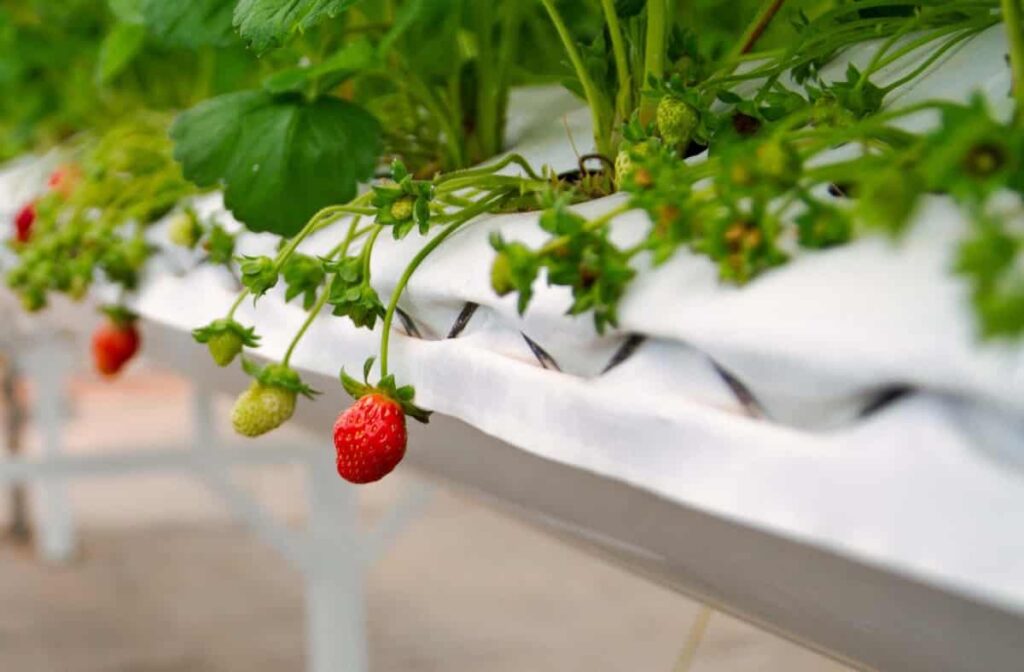
How to get started with vertical strawberry farming
If you’re planning for a way to increase your income, vertical strawberry farming may be the way to go. Here’s how to get started:
- Choose a suitable variety of strawberries for your climate. Only some strawberries will do well in all climates, so choosing a variety that will thrive in your area is important.
- Find a sunny spot in your yard or garden where you can set up your vertical farm. Strawberries need at least 6 to 7 hours of sunlight per day to produce fruit, so ensure your chosen location gets plenty of sunlight.
- Decide how many plants you want to grow and purchase the appropriate number of strawberry plants from a nursery or garden center.
- Plant your strawberries in the ground or containers filled with potting soil, ensuring each plant has plenty of room to spread out. If you’re growing strawberries in containers, water them regularly, as they can dry out quickly.
- Once your strawberries start producing fruit, enjoy fresh-picked berries all season long!
Tips for success with vertical strawberry farming
If you’re planning new way to increase your income with strawberries, vertical strawberry farming may be the perfect option. This type of farming allows you to maximize space and produce more strawberries in a smaller area. Here are some tips for success with vertical strawberry cultivation:
- Choose a suitable variety of strawberries: There are wide varieties of strawberries, so choosing one that will do well in a vertical farm setting is important. Some good options include ‘Albion’ and ‘Seascape.’
- Create a robust support system: Strawberries are heavy fruit, so your support system will need to be strong enough to hold up the weight of the plants and fruit. Trellises or cages are good options for this.
- Keep the plants well-watered: Vertical farms can be pretty dry, so it’s essential to ensure your plants get enough water. It is essential to check the soil at the plant base regularly and water as needed – avoid overwatering as this can lead to root rot.
- Fertilize regularly: Like any other type of farming, regular fertilization is key to success with vertical strawberry farming. Look for a fertilizer designed for strawberries or use a general-purpose fertilizer diluted according to package directions.
- Harvest often: One advantage of vertical strawberry farms is that you can harvest much more frequently than traditional methods. This means you’ll have fresh berries available all season long.
In case you missed it: Croton Plant Care in India: Exclusive Tips for Beginners
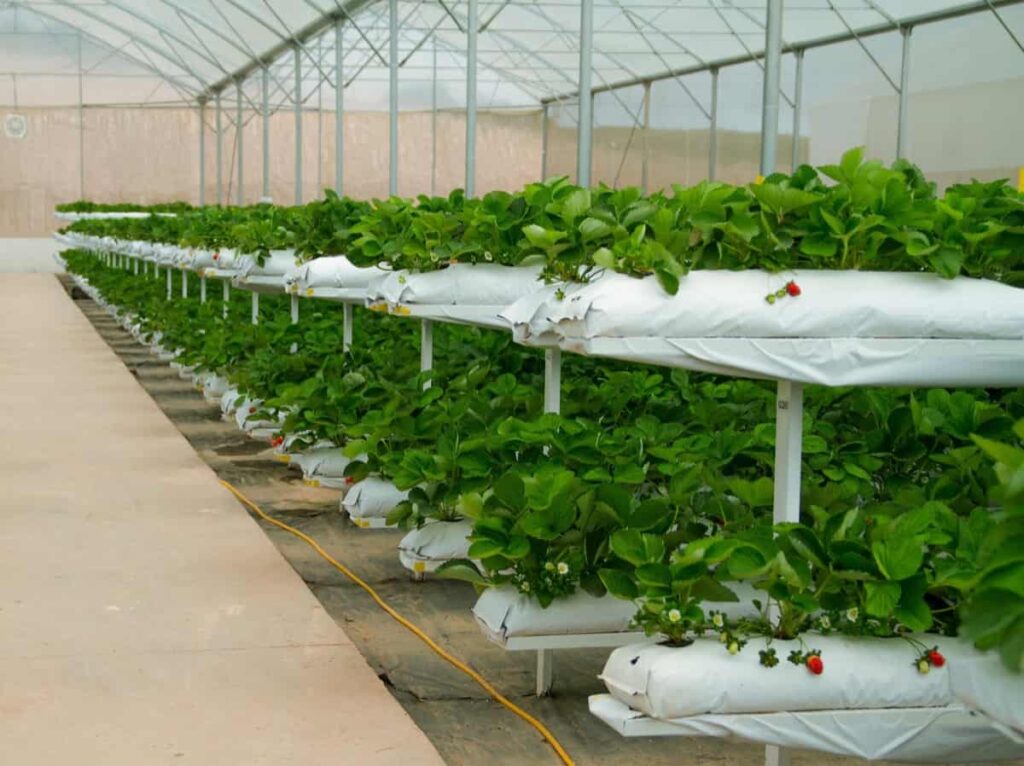
How to build a trellis for vertical strawberry farming
Vertical farming is an excellent option to increase your strawberry yield. Building a trellis is a simple way to create a vertical growing surface for your strawberries. Here’s how to build a trellis for vertical strawberry farming:
- Start by driving two stakes into the ground at the desired location for your trellis. Make sure the stakes are firmly in place and evenly spaced.
- Next, attach horizontal crosspieces to the tops of the stakes. You can use pre-cut lumber or cut your boards to size.
- Once the crosspieces are in place, it’s time to add the vertical supports. These can be made from chicken wire, PVC pipe, or any other material that will provide support for the strawberry plants.
- Finally, attach the strawberry plants to the supports using plant ties or clips. You need maintain enough distance between each plant so that they have room to grow. With these simple steps, you’ll have a sturdy trellis perfect for vertical strawberry farming.
Vertical strawberry farming equipment
Vertical strawberry farming may be the answer if you want to increase your income. This type of farming involves growing strawberries in vertically stacked trays or shelves. This allows farmers to maximize space and produce more strawberries in a smaller area. There are many benefits to vertical strawberry farming, including increased production, less labor, and reduced water and fertilizer usage.
Additionally, vertical strawberry farms can be located closer to markets, which reduces transportation costs. If you are interested in starting a vertical strawberry farm, there are a few things you will need:
- You will need to purchase trays or shelves designed explicitly for strawberry production. These can be found at most agricultural supply stores.
- You will need to select a site for your farm with plenty of sunlight and good drainage.
- You will need to purchase Strawberry plants from a nursery or online retailer.
With the right equipment and planning, vertical strawberry farming can be a great way to increase your income.
In case you missed it: Vertical Saffron Farming: The Red Gold Revolution for Excellent Profits
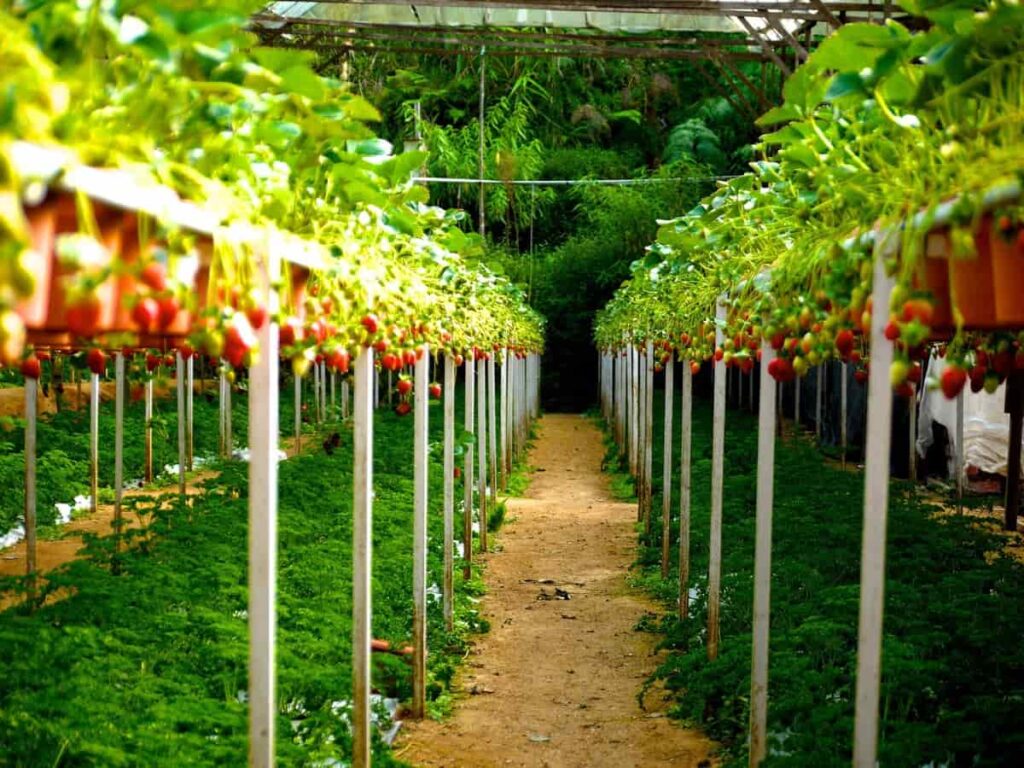
Hydroponic vertical strawberry farming
Hydroponic vertical strawberry farming is a new and innovative way to increase your income. This type of farming allows you to grow strawberries in a smaller space, which means you can produce more strawberries in the same amount of time. Additionally, hydroponic strawberry farming uses less water than traditional methods, making it more environmentally friendly.
Greenhouse vertical strawberry cultivation
Vertical farming is a type of agriculture where crops are grown vertically stacked layers in a controlled environment. Vertical strawberry farming is a new way to increase your income and produce strawberries year-round. Strawberries are a versatile fruit in many dishes, from breakfast smoothies to dessert pies. They’re also a popular choice for home gardeners. But strawberries generally have a short growing season and are susceptible to pests and diseases. This makes them difficult to grow commercially.
That’s where vertical strawberry farming comes in. By growing strawberries vertically in a greenhouse, farmers can extend the growing season and protect the crop from pests and diseases. And because vertical strawberry farms can be built anywhere – including on rooftops and in urban areas – they offer a new way for farmers to increase their income. If you’re thinking about starting a vertical strawberry farm, you should keep a few things in mind.
First, you’ll need to choose the right location for your farm. The climate inside a greenhouse can be different from the outside world, so you’ll need to find a spot with enough sunlight and the right temperature for strawberry cultivation. Next, you’ll need to decide on the system you want to use for your farm. There are many types of vertical farming systems, each with its advantages and disadvantages. Doing some research will help you choose the best system for growing strawberries vertically.
In case you missed it: Vertical Tomato Farming: Modern Way of Getting More Yields in Less Space
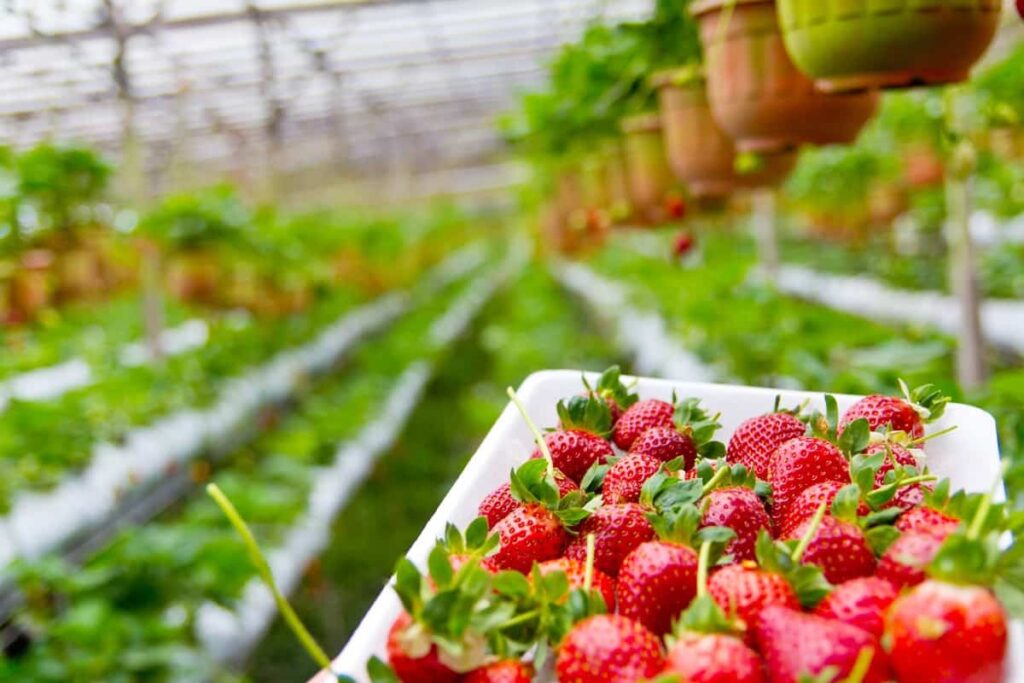
Increase strawberry yield with vertical gardening
If you want a new way to increase your strawberry yield, then vertical farming may be the answer. This type of farming allows you to grow more strawberries in a smaller space, which can help you to increase your income. There are many benefits to vertical strawberry farming, including the fact that it requires less water and fertilizer than traditional methods. Additionally, it is easier to control pests and diseases when crops are grown vertically. As a result, your strawberries will be healthier and more productive.
To start vertical strawberry farming, you will need to purchase some special equipment. This includes trellises or support structures for your plants. You can find these items at most gardening stores or online retailers. Once you have the necessary supplies, you can begin planting your strawberries. Vertical strawberry farming is a great way to increase your yield and income. With less water and fertilizer requirements, this method is more sustainable than traditional methods. If you want a new way to grow strawberries, then vertical farming may be the right choice.
Cost and profit in vertical strawberry farming
The cost of vertical strawberry farming will vary depending on the scale of the cultivation. However, some basic costs are associated with this type of farming. These include the cost of the land, the necessary equipment, and the labor cost. The location of the farm will determine the land cost. The equipment cost will be determined by the type of equipment used and the number of acres that need to be covered.
In case you missed it: Contract Goat Farming in India: How to Earn an Extra Income from this Long-Term Investment
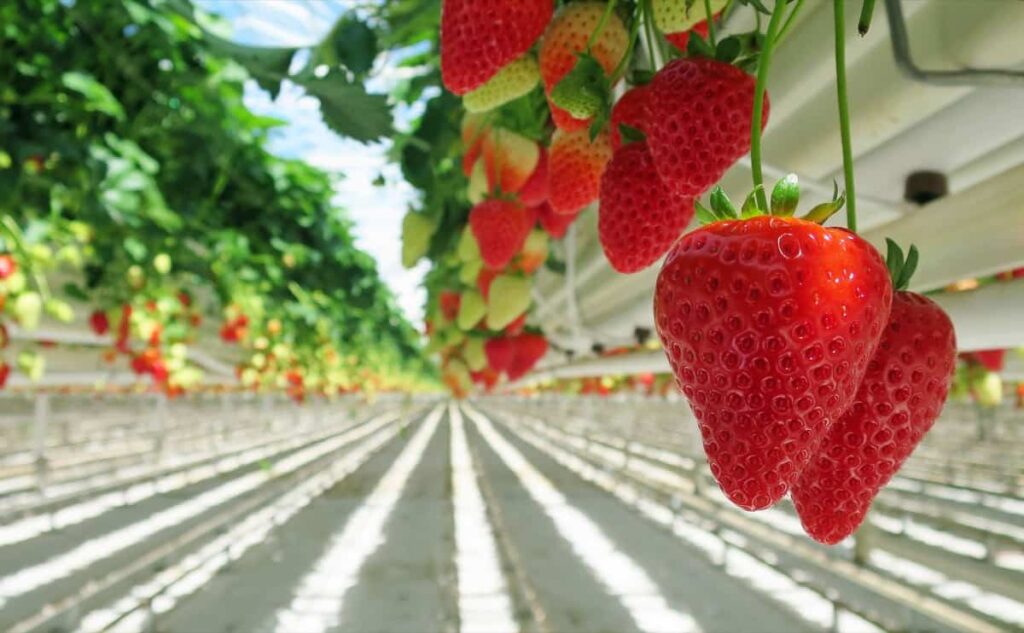
The labor cost will be determined by the number of workers needed and their hourly wage. In terms of profit, vertical strawberry farming can be quite profitable. This is because strawberries are a high-value crop and can be grown in a relatively small space. This means that farmers can get a higher return on investment (ROI) than other types of farming. Furthermore, vertical strawberry farming allows farmers to extend the growing season by using artificial lighting and climate control. Farmers can sell strawberries year-round, which further increases their profits.
Conclusion
Vertical strawberry farming is a great option if you’re looking for an efficient and sustainable way to farm strawberries. This type of farming allows you to grow more strawberries in a smaller space, using less water and resources. Not only is vertical strawberry farming good for the environment, but it’s also good for your wallet. So if you’re looking to save money and help the planet, vertical strawberry farming is the way. With proper planning and care, you can expect good profits.
- Profitable Village Farming Business Ideas in 2024
- High-Yield Aquaculture: Fast-Growing Fish for Farming
- Effective Fish Pond Construction Techniques for Beginners
- Irrigation and Water Management in Pineapple Farming
- Blossom to Harvest: Mastering Flowering and Pollination in Papaya Farming
- Pig Fattening Essentials: From Selection to Sale for Beginners
- Raising Wagyu Cattle: A Complete Guide for Premium Beef Production
- Soil Types and Their Water Holding Capacity
- Optimizing Irrigation Schedules for Coconut Groves for Enhanced Yield
- Espresso Your Garden: Coffee Grounds for Healthier Acid-Loving Plants
- The Best Soil Mix for Snake Plants: How to Mix Your Own Snake Plant Soil
- Green Thumb Success: Expert Tips for Cultivating Greenhouse Beans All Year Round
- Bloom All Year Round: The Ultimate Guide to Indoor Hyacinth Care
- Eco-Friendly Gardening: How to Make Liquid Fertilizer from Kitchen Waste
- Ultimate Guide to Grow Anise in Pots: Explore Seed Propagation to Harvesting
- Guide to Raising Chester White Pigs: Discover Breed Facts to Growth Management
- Mastering the Elegance: The Ultimate Guide to Weeping Cherry Tree Care, Planting, and Maintenance
- Ultimate Guide to Planting Garlic in Grow Bags: Growing Strategies for Beginners
- How to Fix Spider Plant Leaf-Related Problems: Natural and Organic Remedies
- 10 Reasons Why Your Tulsi Plant is Shedding Leaves: Home Remedies and Solutions
- Optimizing Growth and Yield: The Advantages of Palm Bunch Ash Fertilizer
- Utilizing Neem Oil Extract as a Natural Pesticide for Hydrangea
- From Soil to Harvest: Various Ways in Which Farmers Can Use AI Tools
- Steps to Encourage and Induce Citrus Flowers: A Comprehensive Guide
- How to Fix Snake Plant Leaf-Related Issues: Natural and Organic Remedies
- Transform Your Garden into a Fragrant Oasis with Raat Ki Rani (Night Blooming Jasmine)
- Discover the Ideal Chicken Breeds for Philippine Farms
- How to Create a Poultry Egg Farm Business Plan for Profits
- Grow Lemon Cucumbers Like a Pro: Insider Techniques for Bountiful Yields
- Ultimate Guide to Caring for Your Pink Princess Philodendron: Tips for Thriving Variegation
- Areca Nut Profit Per Acre: Calculating Yield and Cost of Cultivation
- How Kaveri Chicken is Becoming a More Profitable Breed in Indian Backyards
- Transform Your Barn: 9 Steps to Convert a Horse Stall into a Chicken Coop
- Exploring Suffolk Sheep Disadvantages with Limitations and Challenges
- Guide to Solving Potted Lemon Tree Problems: How to Revive Lemon Tree in Containers
- Steps to Encourage Female Pumpkin Flowers: Best Strategies for More Flowers and High Yields
